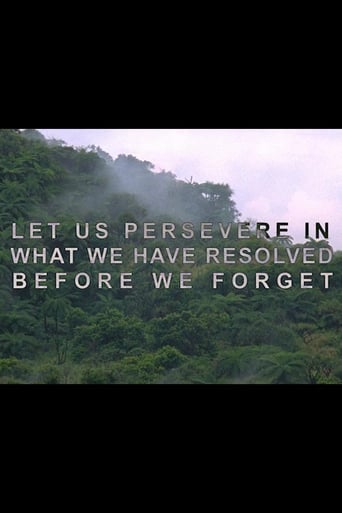TemporaryOne-1
And I Resumed The Struggle The film's finale commentary is a passage from Waiting For G-dot. The Vanuatu native himself says: "John is a ghost. John is the same as Jesus. But John, why did he come? Because G-d made the world. He made the world. And he put custom law down.Life, he put it down, but before life was custom. Culture. He put it all around the world. Afterwards, the new lifestyle, White man found the new lifestyle called money. And you live it. I live with the custom that G-d put around the world. You live with money. The new lifestyle. It is making you take the new lifestyle.From when Captain Columbus found America in 1492. The Americans destroyed the custom of the Red Indians. And then it went to Australia and destroyed the custom there. It went to New Zealand and destroyed the custom there. It went and gave money to the Black people. And it came to Vanuatu, especially to Tanna. Captain Cook discovered the island of Tanna in 1774. The church came in the 1800's. It went to Kwamere to Port Resolution and Aniwa, then to White Sands and Weasisi.Then it came here. Two of my grandfathers with a gun, they took over the church. They took the talk and went around, and the church - the missionary, the Presbyterian church, made a law called the Tanna Law. The church wanted to destroy custom, to remove custom. You couldn't drink Kava. You couldn't make a ceremony, or a feast for a girl or for a young boy for circumcision or whatever.They took away everything that was good about custom and threw it away. This made John come. He heard that you had left the life for men. And so he spoke to us all. He said And he continues speaking but the subtitles quote from Waiting For G-dot: Let us not waste our time in idle discourse. Let us represent worthily for once this foul brood to which a cruel fate consigned us.Let us make the most of it before it is too late. It is not every day that we are needed. Let us do something while we have the chance. Those cries for help still ringing in our ears, they were addressed, those cries for help in our ears, they were addressed to all mankind, to all mankind, but at this moment in time, all mankind is us.All mankind is us whether we like it or not. But that is not the question.What are we doing here? That is the question.And we are blessed in this that we happen to know the answer.Yes, we are magicians. We are happy. I am happy. You are happy. You must be happy. Deep down, if only you knew it. What we do now that we are happy?" The point of the film is to point out the cultural/social/economic crash between indigenous and Western societies, and it's jarring but effective and symbolic that the film ends with the director (the West) superimposing a literary excerpt from a famous and heavily influential work of literature over the Vanuatu native's commentary.In the play Waiting For G-dot, the two main characters, one simplistic and inactive (Estragon) and the other intellectual and proactive (Vladmir), are necessary to each other's existence, much like custom/culture/tradition/atavism/nature/animals and industrialization/technology/capitalism/materialism are unfortunately necessary to each other's existence The Vanautu native speaker is shown to spend his time like Estragon, but speaks like Vladimir about the existential issues his people are facing The play is presents a life-threatening existential crisis (what is there to be done, there is nothing to do, why am I here, etc), the same crisis faced by everybody the whole world over (not just the Vanautu in the film).This should all be self-evident, so just one more point - In the play, the two lead characters realize 1) the impossibility of replacing a person and 2) the responsibility towards another human being and 3) the desire to resume unfinished work, and the realization 1) invests them with a reason to continue to exist and 2) impresses upon them the necessity and worth and magnitude of their existence and 3) presents them with infinite possibilities. This realization brings two people who are oppositional binaries closer together.Western industrialization, technology, modification, materialism, etc, combined with Western religion and culture, are oppositionally binary to indigenous existence, and both sides need to learn to grow together.Just like in the play, there is a rigid binary is set up in which one group (indigenous, Estragon) feels like there is nothing to do and another group (West, Vladimir) does something. The former feel insignificant in the grand scheme of things (the native "surrendering" to the volcano....) and the latter realise that our nothingness means we can do anything, infinite possibilities are ours, you haven't yet tried everything so resume the struggle.Hope deferred maketh the heart sick: but when the desire cometh, it is a tree of life.

